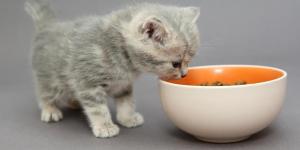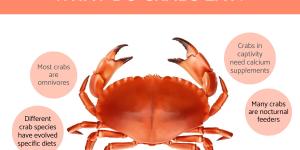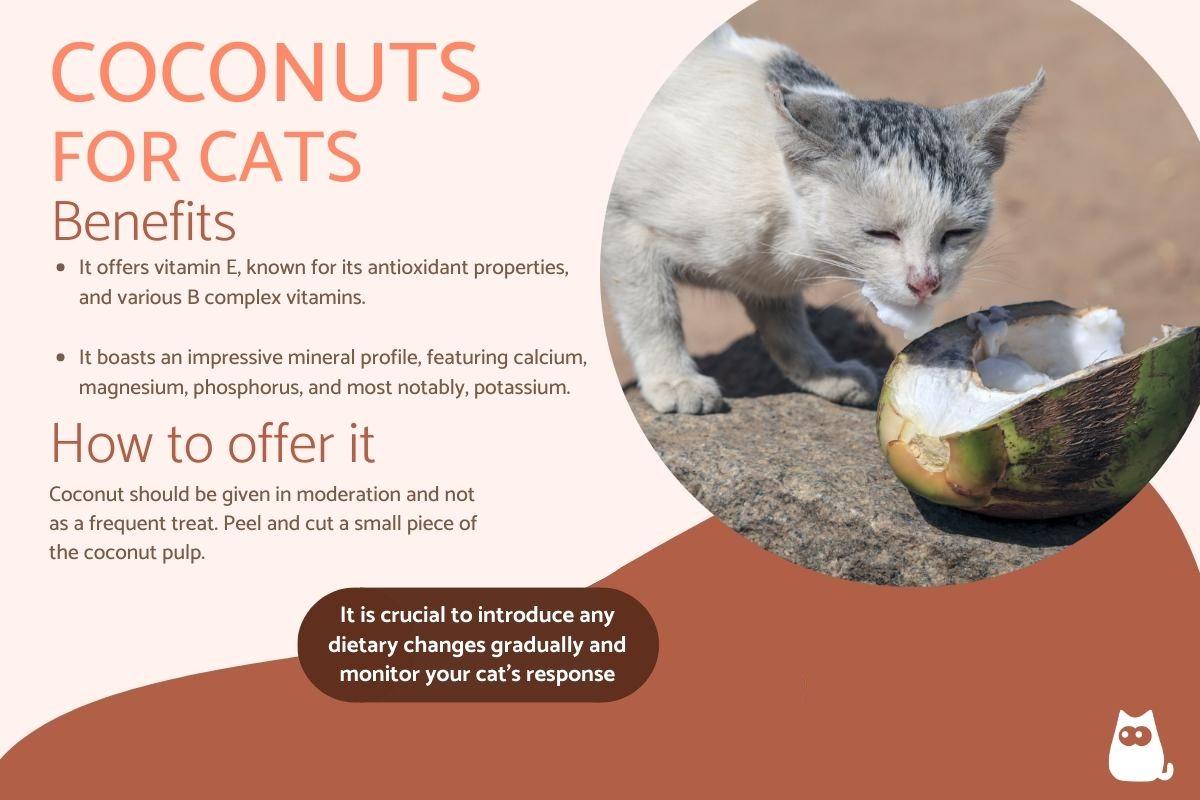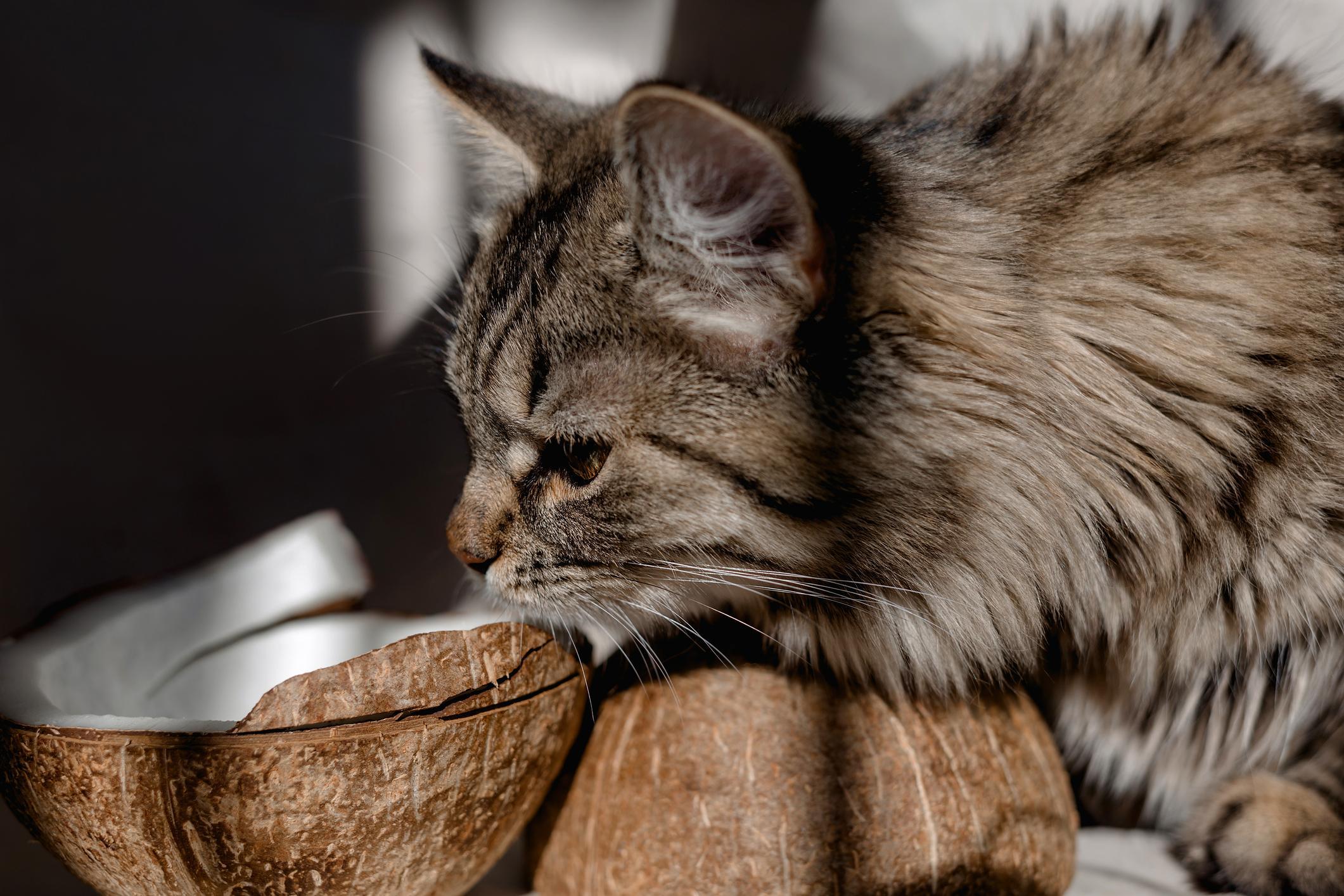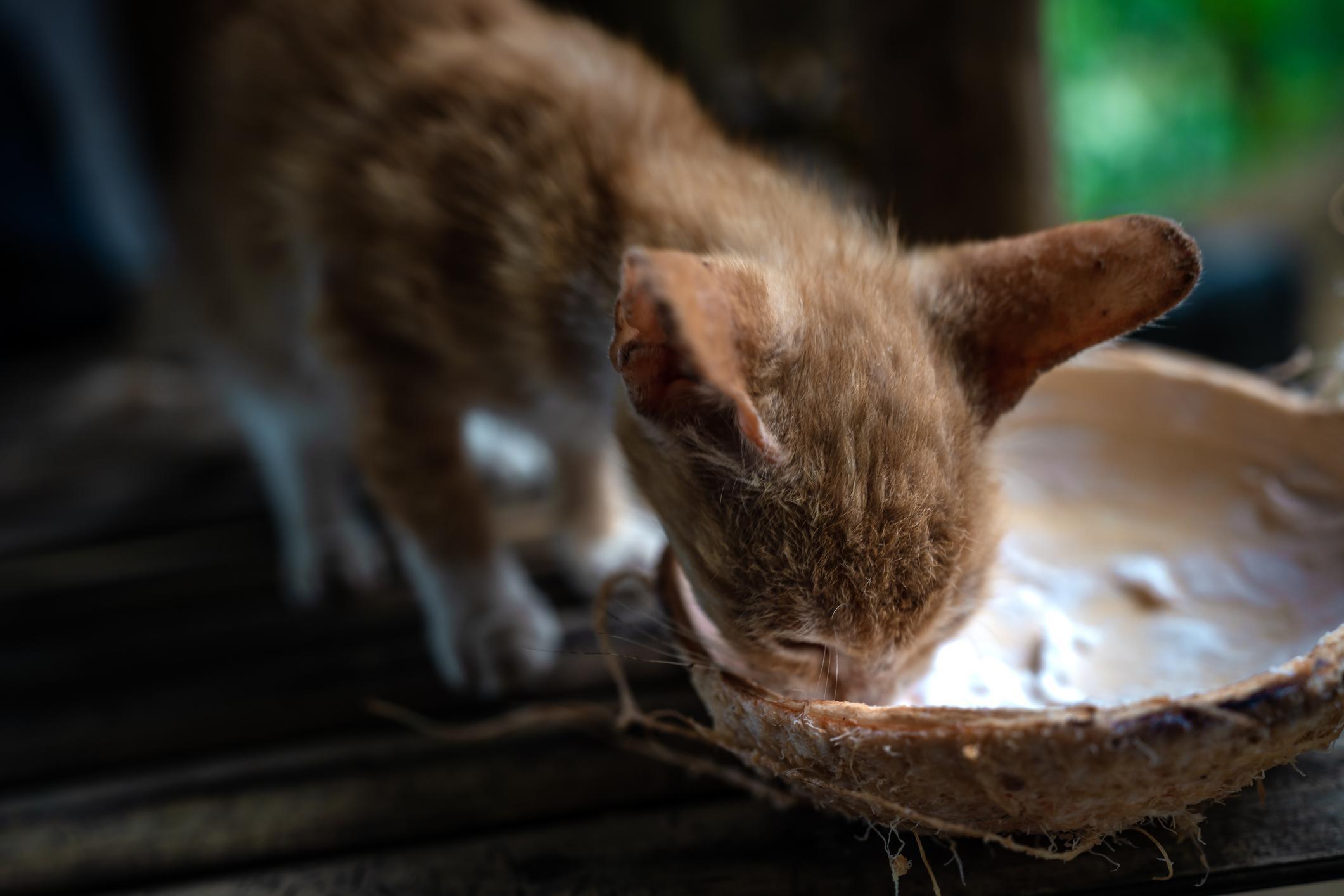Can Cats Eat Coconut?



See files for Cats
As pet owners, we often find joy in offering our feline companions a taste of our favorite treats. Coconut, with its exotic allure and potential health benefits, might pique our curiosity about whether it can be enjoyed by our cats too. While coconut does contain some nutrients that could appeal to cats, it's essential to proceed with caution and consider their specific dietary needs.
In this AnimalWised article, we'll explore if cats can eat coconut, as well as the potential benefits and risks.
Is coconut good for cats?
Cats, being carnivorous animals, thrive on a diet primarily based on animal-origin protein sourced from meat or fish. While they can consume small quantities of other foods like legumes, oils, or fruits as complements, the focus should always remain on their essential protein intake.
Coconut, though not toxic to cats, is not a necessary part of their diet and should only be offered if your cat shows a liking for it. While it won't harm them, there are healthier alternatives to provide the vital nutrients they need. Moreover, coconut stands out for its high fat and caloric content, which may not be ideal for all cats.
Can cats drink coconut water?
Coconut water, found inside the coconut, differs from coconut "milk" and is obtained by blending ripe and crushed pulp with water. However, it's crucial to note that coconut water is not a requirement in a cat's diet and can be skipped altogether. In fact, its composition, rich in potassium, doesn't make it advisable for cats.
Can cats consume coconut oil?
Coconut oil or fat, extracted from fresh or dried coconut meat, finds various uses in the kitchen, cosmetic products for skin and hair care (with a veterinarian's prescription), and even as a repellent against external and internal parasites. While including small doses of coconut oil in their diet is possible, it's essential to monitor your cat's response and consult your vet for proper guidance.
Can cats eat dry coconut?
Cats should not eat dry coconut or any coconut products as a part of their regular diet. Dry coconut, like other coconut products, contains high levels of fat, which can be harmful to cats, especially those prone to obesity or with pancreatic issues. Moreover, dry coconut can be challenging for cats to chew and digest, and there is a risk of choking or gastrointestinal blockage if they consume large pieces.
You might be interested in another article where we discuss whether cats are carnivores or omnivores.

Benefits of coconut for cats
When it comes to feline nutrition, coconut stands out as a potential aid for cats needing to gain weight or an extra energy boost.
Besides its caloric content, coconuts offer a wealth of vitamins, particularly vitamin E, known for its antioxidant properties, and various B complex vitamins. These essential nutrients play a crucial role in supporting a cat's overall health and well-being.
Moreover, coconut boasts an impressive mineral profile, featuring calcium, magnesium, phosphorus, and most notably, potassium. These minerals are vital for maintaining a cat's bone health, muscle function, and overall physiological balance.
In addition to vitamins and minerals, coconut is a rich source of fiber and water, two elements that significantly benefit feline digestive health and hydration. The fiber content aids in promoting a healthy intestinal transit, while the water content helps cats stay hydrated, especially during scorching weather conditions. This can be particularly beneficial during hot summer months, when dehydration can be a concern.
Coconut provides valuable nutrients essential for a cat's body to function optimally. However, it's crucial to note that while coconut water may be enjoyed by humans for its numerous benefits, it's not recommended for cats. The high potassium content in coconut water is not suitable for feline consumption.
Instead, if you want to offer your cat a refreshing treat or help them cool off, consider using homemade broths or other cat-friendly fruits with high water content. Ensuring your cat's safety and well-being is paramount, and offering them suitable alternatives is always the best approach.
Make sure to check out our other article, where we've listed fruits and vegetables recommended for cats.
How to give coconut to a cat?
Offering coconut to your cat should be done with caution and only if the cat shows genuine interest in it. If your cat expresses curiosity or eagerness towards coconut, it can be given as a natural treat.
Coconut should be given in moderation and not as a frequent treat. It should not replace a balanced and appropriate cat diet recommended by your veterinarian.
If you have a fresh coconut, you can peel and cut a small piece of the coconut pulp. Remove the inner rind and offer the plain coconut pulp to your cat as a special treat. Ensure the coconut piece is small enough for your cat to handle and chew easily.
As for coconut water, it is not advisable for cats. The high potassium content in coconut water makes it unsuitable for feline consumption. Instead, it's better to opt for safer alternatives to keep your cat hydrated, such as providing fresh water regularly or using homemade broths made specifically for cats.
Regarding coconut oil, it can be introduced into a healthy adult cat's diet by mixing a quarter to a half teaspoon of coconut oil directly with their food. Coconut oil has gained popularity for its potential health benefits, but it's essential to start with small amounts and monitor your cat's response to ensure they tolerate it well.
Always remember that each cat is unique, and their dietary needs and preferences may vary. If you have any concerns about introducing new foods or ingredients to your cat's diet, it's advisable to consult with a veterinarian to ensure the safety and well-being of pet.

Amount of coconut for a cat
For fresh coconut pulp, you can offer a very small piece, about the size of a pea, as an occasional treat. Make sure to remove the inner rind and any large or hard pieces that could be difficult for your cat to chew.
If you are considering adding coconut oil to your cat's diet, start with an extremely minimal amount, such as a quarter to a half teaspoon, mixed with their regular food.
It's essential to consult with your veterinarian before introducing any new foods or supplements into your cat's diet, including coconut oil. Each cat's health condition and dietary needs can vary, and a professional's advice will ensure that the introduction of coconut oil aligns with your cat's individual requirements.
Should your cat display any adverse symptoms or reactions after consuming coconut or coconut oil, it's imperative to review the amounts given or discontinue its intake altogether.
Make sure to check out our other article, where we've listed the fruits and vegetables that cats should avoid eating.
Contraindications of coconut consumption in cats
As highlighted throughout the article, while coconut and its derivatives can offer some benefits for certain cats, it's essential to be cautious and avoid feeding them to cats with specific health conditions or dietary restrictions. Here's a summary of those conditions:
- Cats with problems of overweight, obesity, or a tendency to gain weight should avoid coconut and its derivatives due to their caloric content.
- Cats with pancreatic disorders should refrain from consuming coconut because of the high fat content, which can put additional strain on the pancreas responsible for aiding digestion.
- Cats on a diet with reduced fat intake or suffering from digestive disorders should not be given coconut as it may exacerbate their condition.
- Cats with electrolyte regulation problems, especially those with acute or chronic kidney disease, should be careful with coconut consumption due to its potassium content. Adding more potassium to their diet could be harmful in cases of hyperkalemia (elevated blood potassium levels).
Prioritizing your cat's health means considering their individual needs and health status before introducing any new food items. If your cat has any of the above-mentioned health conditions or any other medical concerns, it's essential to consult with a veterinarian to create a suitable and safe diet plan that meets their specific requirements.
Side effects of coconut in cats
It is crucial to recognize the potential risks associated with feeding coconut and its derivatives to cats.
The high fat and caloric content of coconut can indeed lead to weight gain, which may be problematic for cats prone to obesity or those with weight management issues.
Moreover, the fats in coconut can cause digestive disturbances, such as diarrhea or pancreatitis, which can be severe and life-threatening. Pancreatitis can manifest with symptoms like lethargy, loss of appetite, abdominal pain, vomiting, and diarrhea, requiring immediate veterinary attention.
The fiber and water content in coconut can also have a laxative effect on cats, leading to gastrointestinal issues if consumed in excessive amounts.
Furthermore, the substantial potassium content in coconut can be hazardous for cats with electrolyte regulation problems, especially those with kidney disease, as it may trigger hyperkalemia. The clinical signs of hyperkalemia include generalized muscle weakness and severe cardiac changes, which can be life-threatening and necessitate urgent veterinary care.
In light of these potential risks, if there is any suspicion that coconut or its derivatives have negatively affected your cat's health, seeking prompt veterinary assistance is vital. A veterinarian can diagnose and treat any arising symptoms and recommend a suitable treatment plan. Additionally, it's essential to refrain from giving coconut to your cat in the future, especially if they have experienced any adverse reactions previously.
If you want to read similar articles to Can Cats Eat Coconut?, we recommend you visit our Healthy diets category.
- Veterinary Portal. (2003). "Potassium disorders: hypokalemia and hyperkalemia" .

